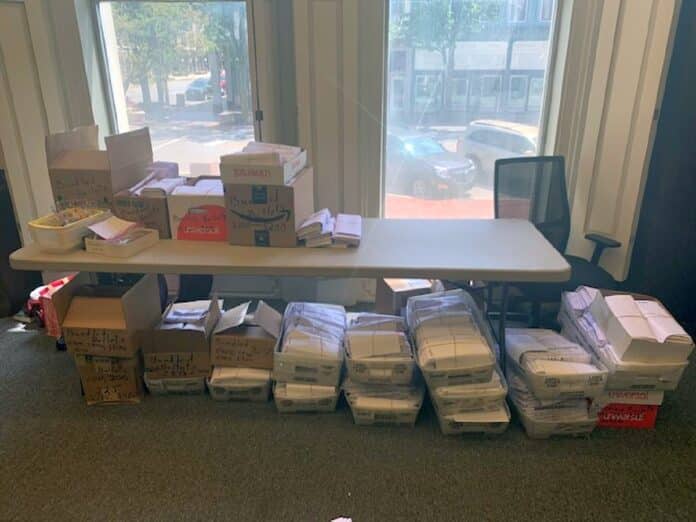
Local election officials are confident in safeguards to prevent fraud on mail-in absentee ballots as they prepare for what they believe will be a record number of voters casting ballots through the mail for the Nov. 3 presidential election.
The subject of voter fraud has received increased attention in recent days as President Donald Trump continued to attack states for seeking to increase mail-in voting due to the coronavirus pandemic, claiming — without evidence — that expanded mail-in balloting will lead to “massive fraud and abuse.”
On Thursday, Trump floated the idea of delaying the Nov. 3 presidential election and pushed unfounded allegations that increased mail-in voting due to the coronavirus pandemic would result in fraud, The Associated Press reported.
His claims of voter fraud are not supported by research or historical records, and Twitter labeled similar claims the president made in May as “unsubstantiated.” Trump himself voted by mail in the last Florida Republican primary.
[sc:text-divider text-divider-title=”Story continues below gallery” ]
Local election officials are preparing for the COVID-19 pandemic to last through the fall and are drawing up plans to prevent the spread of the virus from disrupting the presidential election, including how they would count a record number of mail-in ballots.
This year’s presidential primary, which was pushed back four weeks to June 2 due to the pandemic, was the first election in Indiana to feature widespread mail-in voting after state election officials allowed “no excuse” mail-in absentee voting, meaning voters did not need to provide an excuse for why they couldn’t vote in person.
As a result, a record 8,313 voters in Bartholomew County cast ballots through the mail — more than the combined total of all mail-in ballots cast in the county in every presidential primary and general election since 2008, according to county records.
There were no cases of voter fraud or other election crimes in Bartholomew County during the primary, and Bartholomew County Clerk Jay Phelps sees little reason to expect anything different during the general election.
In addition, Phelps, who has been county clerk for five and a half years and working in the election office for 10 years, can’t recall the last time there was a case of voter fraud in Bartholomew County, but suspects it has been at least two decades and “probably a little farther back than that,” he said.
Bartholomew County Prosecutor Bill Nash also said he cannot recall any reports of voter fraud in the county being referred to his office, and only remembers one instance in which the legality of a vote was questioned.
“In the 17.5 years that I’ve been in office, I’ve only had one report of it that I can recall,” Nash said. “…My recollection is that it had to do with someone who joined the military and were still voting and weren’t doing it the right way. It wasn’t fraud. It was a violation of the rules. It wasn’t like they were pretending to be someone else.”
“I don’t remember any serious report coming over that a person committed an act that would constitute voter fraud and we want you to consider prosecution,” he added.
Requests outpacing 2016
So far, requests for mail-in absentee ballots in Bartholomew County are already outpacing what local election officials saw during the 2016 presidential election, Phelps said.
As of Thursday, a total of 441 voters in Bartholomew County had already requested mail-in absentee ballots for the general election. By comparison, 348 voters had requested mail-in absentee ballots by September 2016.
Phelps said he received “a lot of pushback” on social media after urging voters to vote by mail during the primary this past spring to reduce the chances of spreading COVID-19 at polling sites during the June primary, with members of the public accusing him — with no factual basis — of “perpetuating fraud” and “you can’t trust the system.”
“There’s a lot of misinformation out there,” Phelps said. “…When I hear somebody make those comments, it’s frustrating to me because, in the primary, we were working 10, 11, 12 hours — even at times at 1 o’clock in the morning — to get those absentee ballots by mail processed in a timely matter and done in the best, organized and safe and secure way possible. I’m taking away time from my family to not tuck my kids into bed just because I’m going to do a process that, ‘well, it may be fraud, maybe not.’ No, I’m doing it because I believe in the system and I believe it works and I believe there are checks and balances and accountability.”
Fraud described as ‘rare’
Election experts widely say that all forms of voter fraud are rare, The Associated Press reported. The Brennan Center for Justice in 2017 ranked the risk of ballot fraud at infinitesimal 0.00004% to 0.0009%, based on studies of past elections.
Five states — Colorado, Hawaii, Oregon, Washington and Utah — relied on mail-in ballots even before the coronavirus pandemic raised concerns about voting in person in November. Those states say they have the necessary safeguards in place to ensure that a hostile foreign actor doesn’t co-opt the vote. More states intend to rely more heavily on mail-in voting due to the pandemic.
The most recent election-related crime in the Columbus area occurred nearly 10 years ago in Jennings County, according to the Heritage Foundation, a conservative think tank that tracks documented cases of fraud.
Former state representative, long-time Democratic Party worker and North Vernon resident Mike Marshall was indicted by a grand jury on Oct. 20, 2011, on 20 counts of voter fraud, 12 counts of forgery and 13 counts of perjury, The Republic reported. Under a plea agreement, all charges were dropped in exchange for Marshall’s three guilty pleas, each a Class D felony. Marshall was sentenced to 18 months in jail, with half the sentence suspended.
Marshall admitted in court that he filled out three applications for absentee ballots during the 2010 fall campaign for his son, a Marine stationed at the time in California, his brother, who lives in Georgia, and for a former roommate who no longer lives in Jennings County.
“I’m not saying it doesn’t exist or some folks can’t go rogue and try to do something,” Phelps said. “However, the processes in place (in Bartholomew County) will probably catch those types of instances.”
Safeguards
There are several levels of safeguards in place in Bartholomew County to prevent and detect a range of election-related crimes, including false voter registrations, fraudulent use of absentee ballots, and impersonating a voter who has died, Phelps said.
People cannot register to vote in Indiana without a local clerk’s office verifying that they live where they say they do, Phelps said. First-time applicants must provide documentation that links them to the address they listed on the application, which can be a bank statement, utility bill or driver’s license.
Once the clerk’s office receives a completed application and supporting documentation, the voters are placed in the statewide voter registration system on a pending status for one to two weeks while the clerk’s office sends out a mailer to the address on the application to verify that the applicant lives there.
“In Indiana, that’s why we have the (voter registration) deadlines that we do,” Phelps said. “It’s basically 29 days before the election because we want to be sure that we do have the time to validate through the United State Postal Service that you really do live at the address you say you’re living at.”
Bartholomew County voters can request an application for a mail-in absentee ballot by contacting the clerk’s office, where staff will verify that the voter’s registration is active and ask the voter where they would like the application mailed to. Additionally, voters can fill out the application online at indianavoters.in.gov.
“The application is a legal affidavit basically saying you are who you say you are on the form. If you’re not, it’s a Level 6 felony,” Phelps said.
Bipartisan board
Once the clerk’s office receives the signed application and processes it, a bipartisan absentee board, which includes one Democrat and one Republican, will prepare the ballot and instructions for the voter to follow, Phelps said.
The board must then initial the ballot and stamp it with an official 2020 election stamp and seal that is specially made for all 92 county clerks in Indiana before the ballot is considered valid. The board then mails the voter the ballot and instructions.
When election staff receives a completed mail-in ballot, the absentee board will check that the signature on the ballot and the signature on the absentee ballot application match “to make sure there’s not a major discrepancy” and update the statewide voter registration system, indicating that person had voted by mail.
If the signatures do not match, the board will contact the voter.
All mail-in ballots are kept under lock and key in a secure location at the Bartholomew County Courthouse until Election Day. At the end of every workday, election officials run a report to verify that everyone who returned an absentee ballot had actually been sent one.
If someone voted by mail and then tried to vote in person, the electronic poll pad that all voters have to sign into before voting at a polling location would alert poll workers that person had already voted and the electronic system would block that voter from being able to sign in, which prevents poll workers from programming the voter’s ballot, Phelps said.
Poll workers are unable to override the system. Only the election board can override it, and “that’s never happened,” he said.
In addition, the Indiana State Department of Health sends the Bartholomew County Clerk’s Office each week a list of all registered voters in the county who have died so clerk’s staff can verify the person’s identity before listing them as deceased in the voter registration database.
“We’re not having dead people vote,” Phelps said.
On Election Day, the bipartisan election board, absentee board and other vote counters from both parties organize the ballots by precinct and verify that the number of absentee ballots for all 66 precincts matches what has been recorded in the statewide system, Phelps said.
The counters unseal the ballots and manually run them through a Scantron machine to count them.
“Once we get done counting all of those — for example, in the primary there was over 8,300 — we go and make sure that those 8,300 that we counted in our vote counting system matches what is in our statewide voter registration system,” Phelps said.
“Any bad actor can try to do it, but the chances of you getting caught is so high,” Phelps added later in the interview. “Everyone who has done it in Indiana, to my knowledge, has been caught.”
[sc:pullout-title pullout-title=”Requesting an absentee ballot” ][sc:pullout-text-begin]
Visit indianavoters.in.gov or call the Bartholomew County Voter Registration Office at 812-379-1604 for more information on how to register to vote or request a mail-in absentee ballot.
The deadline to register to vote is Oct. 5.
[sc:pullout-text-end]




